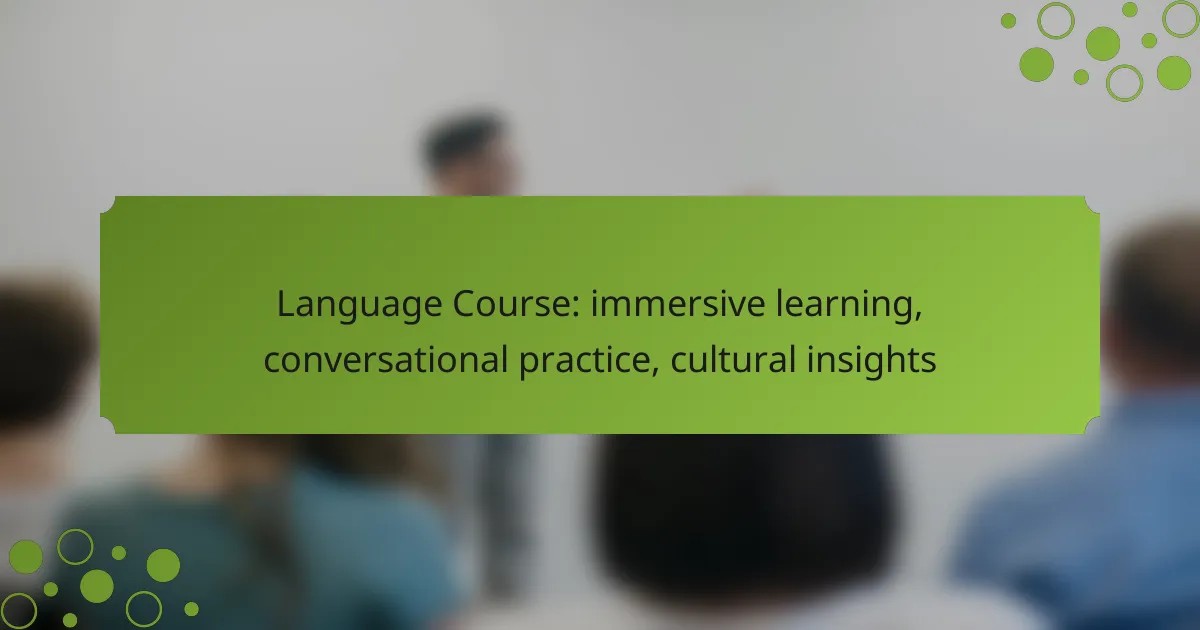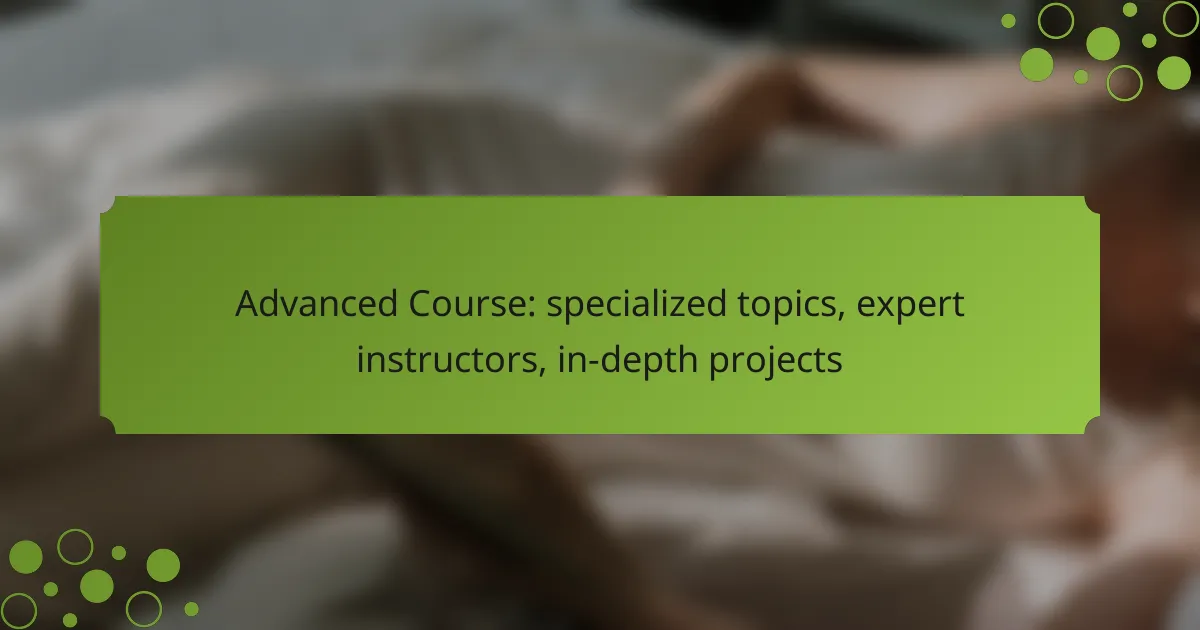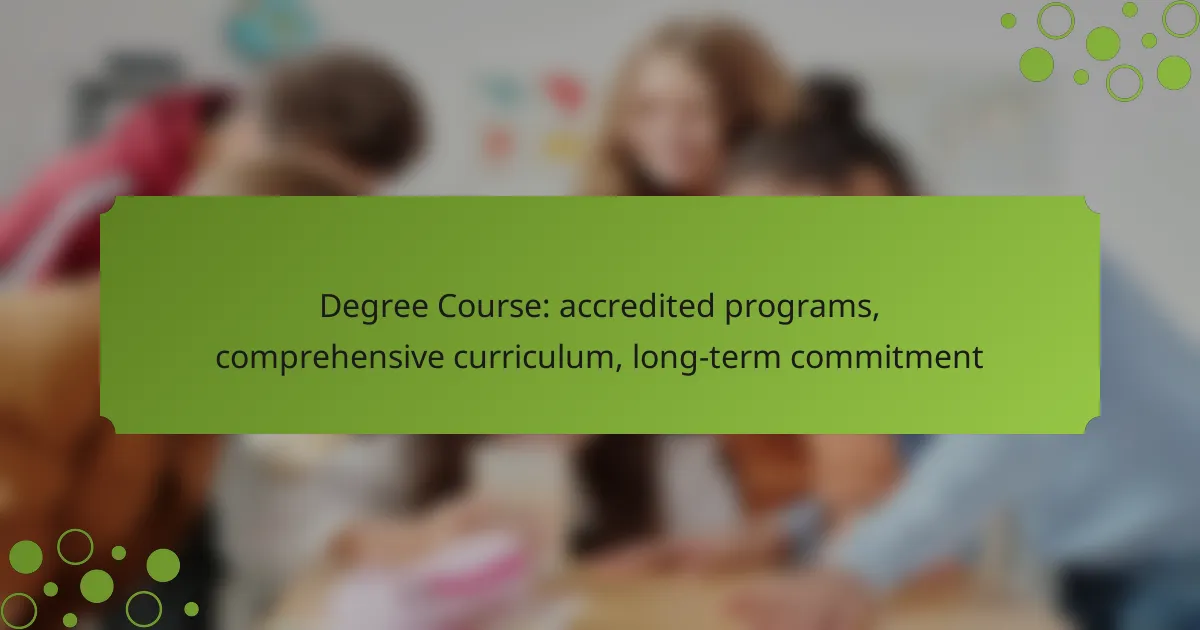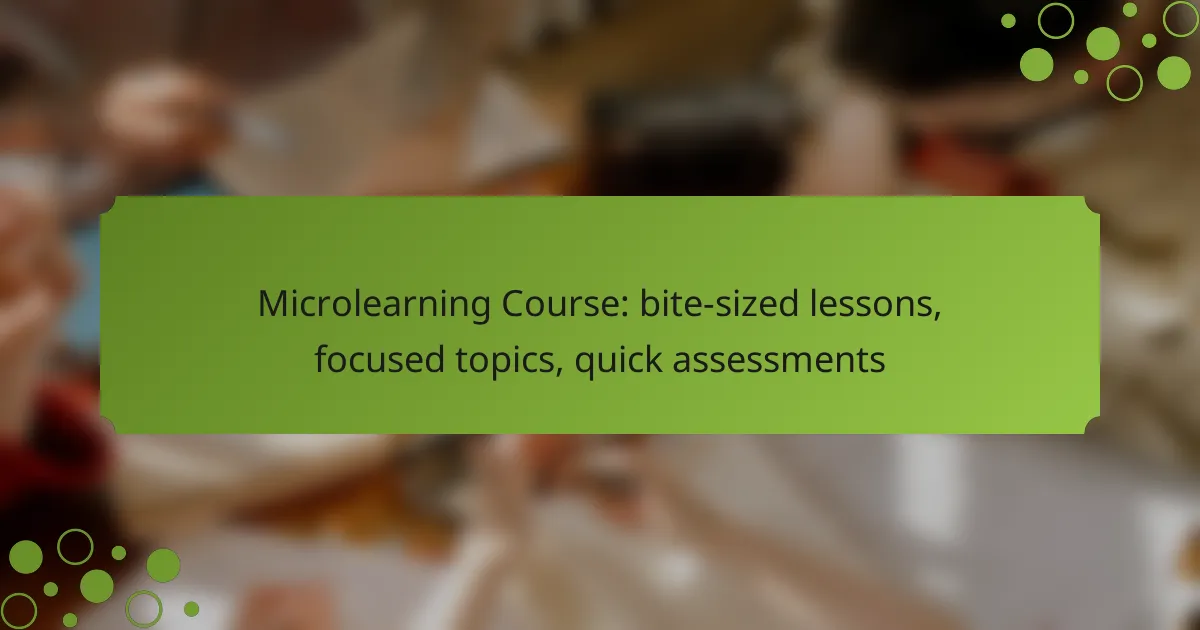Our language course offers an immersive learning experience that enhances language acquisition through real-life interactions and cultural insights. By engaging directly with the language in practical situations, learners develop essential conversational skills and gain a deeper understanding of the cultural context that shapes communication. This holistic approach ensures effective fluency and comprehension, making language learning both enjoyable and impactful.
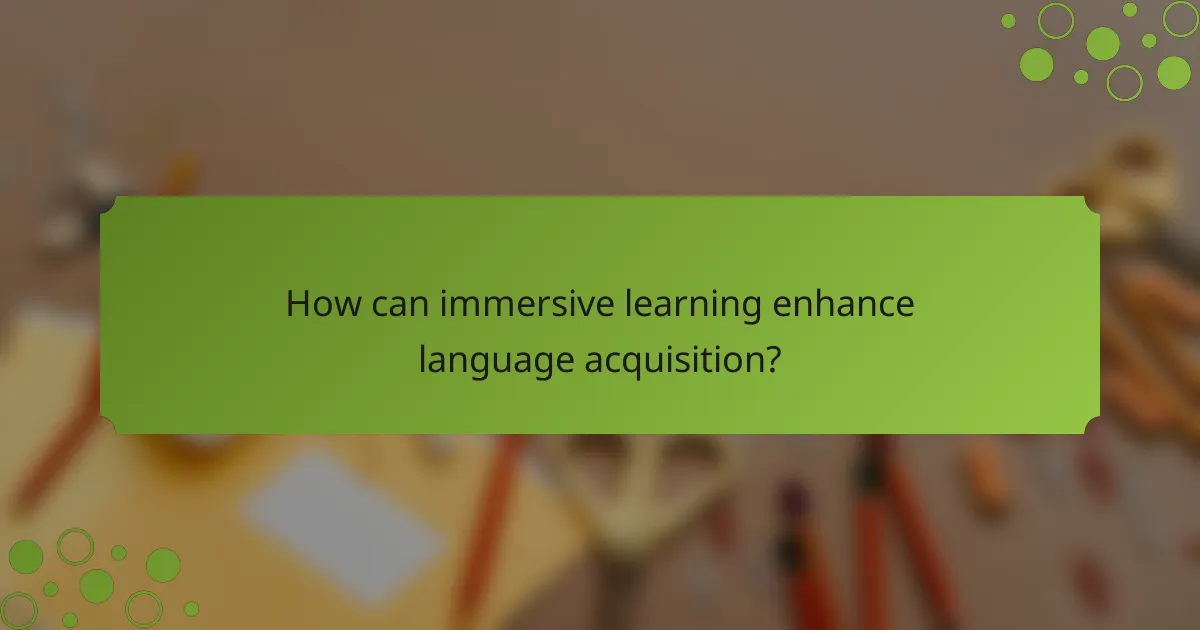
How can immersive learning enhance language acquisition?
Immersive learning significantly boosts language acquisition by placing learners in environments that mimic real-life situations, enhancing their ability to communicate effectively. This approach fosters practical language skills through direct engagement and cultural exposure.
Real-world simulations
Real-world simulations create scenarios where learners can practice language skills in context, such as ordering food in a restaurant or navigating public transport. These experiences help learners apply vocabulary and grammar in practical situations, making the learning process more relevant and effective.
Consider using apps or platforms that offer simulated environments tailored to specific language contexts. This method allows learners to experience language use in a safe setting, reducing anxiety and increasing confidence.
Interactive role-playing
Interactive role-playing involves participants taking on specific roles to practice conversations and scenarios relevant to their language goals. This method encourages spontaneous use of language, improving fluency and comprehension through active participation.
To maximize benefits, choose role-play scenarios that reflect everyday interactions, such as job interviews or casual conversations. Regular practice in these situations can significantly enhance conversational skills and cultural understanding.
Virtual reality experiences
Virtual reality (VR) experiences immerse learners in a digital environment that replicates real-world settings, allowing for interactive language practice. VR can transport users to foreign cities or cultural events, providing a unique opportunity to engage with the language authentically.
Investing in VR language programs can be beneficial, as they often include guided interactions and feedback. However, ensure the technology is accessible and user-friendly to maximize participation and learning outcomes.
Language immersion programs
Language immersion programs involve living in a community where the target language is spoken, facilitating constant exposure and practice. These programs often combine formal education with cultural activities, enhancing both language skills and cultural appreciation.
When considering immersion programs, look for options that include homestays or local interactions, as these experiences can deepen understanding and fluency. Research various programs to find one that fits your budget and learning objectives, as costs can vary widely depending on location and duration.
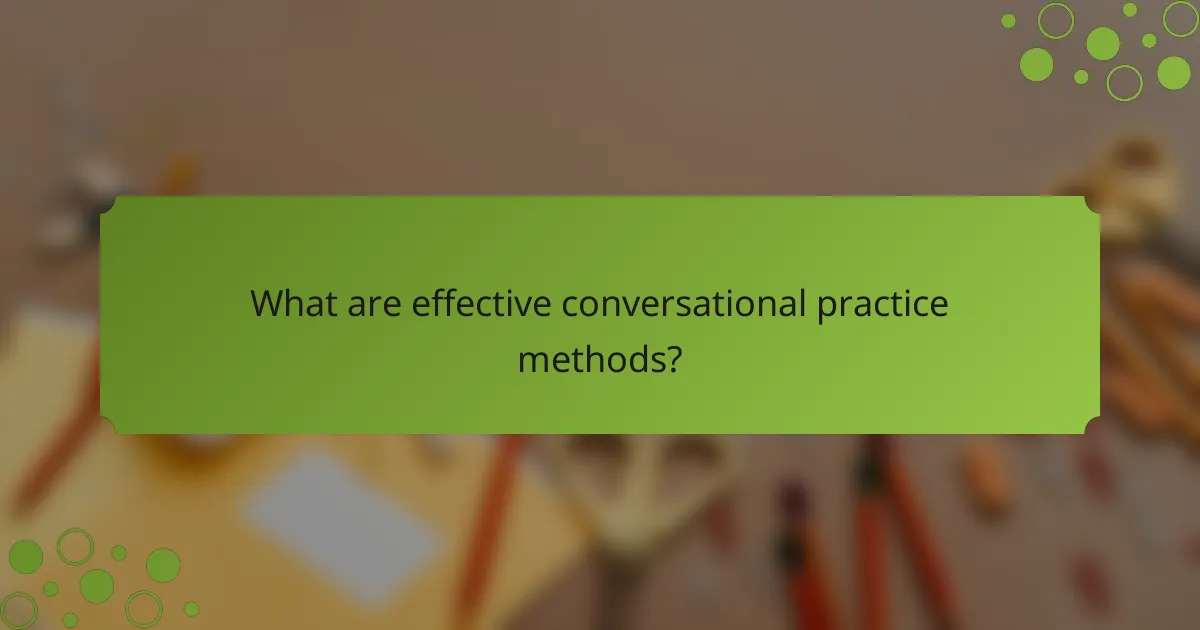
What are effective conversational practice methods?
Effective conversational practice methods focus on real-life interactions and immersive experiences that enhance language skills. These methods encourage active speaking, listening, and cultural exchange, which are essential for fluency and comprehension.
Language exchange platforms
Language exchange platforms connect learners with native speakers for mutual language practice. Users can engage in conversations through text, audio, or video calls, allowing for flexible scheduling and diverse interactions.
Popular platforms include Tandem, HelloTalk, and Speaky, where users can find partners based on language preferences and interests. It’s beneficial to set clear goals for each session, such as focusing on specific vocabulary or conversational topics.
Online conversation partners
Finding online conversation partners can significantly enhance speaking skills. Websites like iTalki and Preply offer opportunities to practice with tutors or casual partners, often at varying price points.
When selecting a partner, consider their teaching style and availability. Regular sessions, even just once a week, can lead to noticeable improvements in confidence and fluency.
Structured speaking exercises
Structured speaking exercises provide focused practice on specific language skills. These can include role-playing scenarios, guided discussions, or using prompts to stimulate conversation.
Incorporate exercises that target different aspects of language, such as pronunciation, grammar, and vocabulary. For instance, practice common phrases used in everyday situations or simulate interviews to build confidence in speaking.
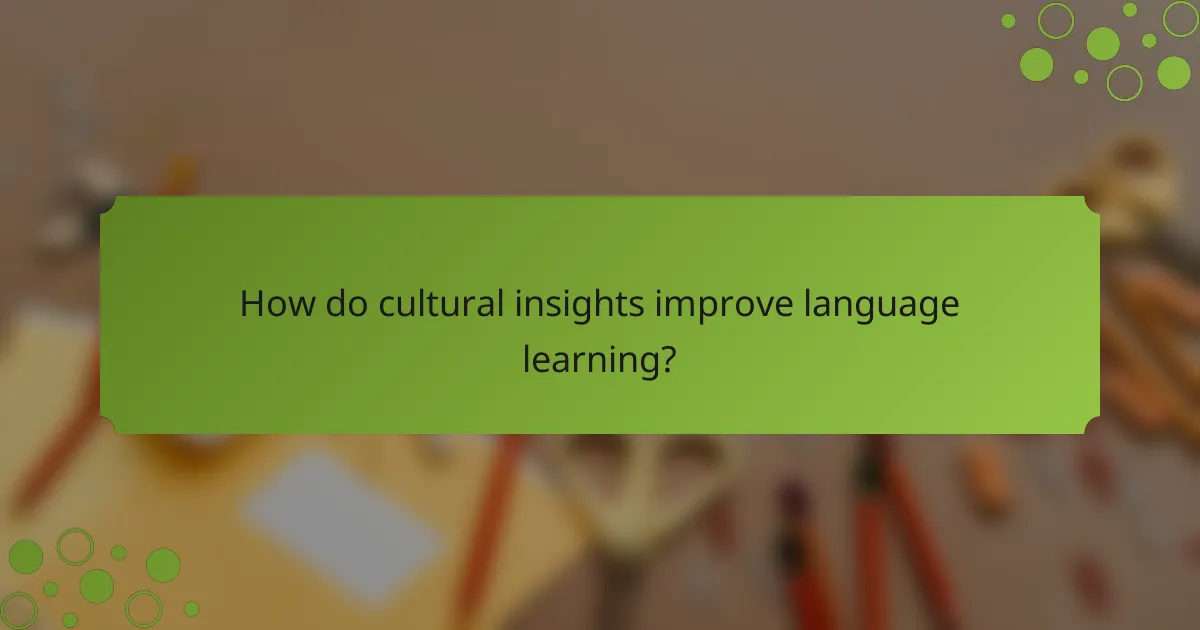
How do cultural insights improve language learning?
Cultural insights enhance language learning by providing context and relevance to the language being studied. Understanding the culture behind a language helps learners engage more deeply and communicate more effectively.
Understanding cultural context
Grasping the cultural context of a language is crucial for effective communication. Language is often intertwined with traditions, values, and social norms, which influence how words and phrases are used. For instance, understanding the significance of politeness in Japanese can help learners navigate conversations more appropriately.
To develop this understanding, learners should explore cultural references, idioms, and expressions that are unique to the language. This can involve studying literature, films, or even social media content relevant to the target culture.
Exploring local customs
Exploring local customs allows language learners to appreciate the nuances of social interactions. Customs such as greetings, dining etiquette, and holiday celebrations can vary significantly between cultures. For example, in many Latin American countries, it is customary to greet with a kiss on the cheek, which may be unexpected for learners from different backgrounds.
Engaging with local customs can be achieved through community events, cultural festivals, or even virtual exchanges with native speakers. This immersion helps learners practice language skills in real-life situations, making their learning experience more authentic.
Integrating cultural materials
Integrating cultural materials into language learning can significantly enrich the educational experience. This includes using music, films, literature, and art from the target culture to create a more immersive environment. For example, listening to popular songs in Spanish can improve vocabulary and pronunciation while also providing insight into contemporary cultural themes.
When selecting materials, consider their relevance and accessibility. Aim for a mix of traditional and modern resources to cover a broad spectrum of cultural insights. Regularly incorporating these materials into study routines can enhance motivation and retention of the language.
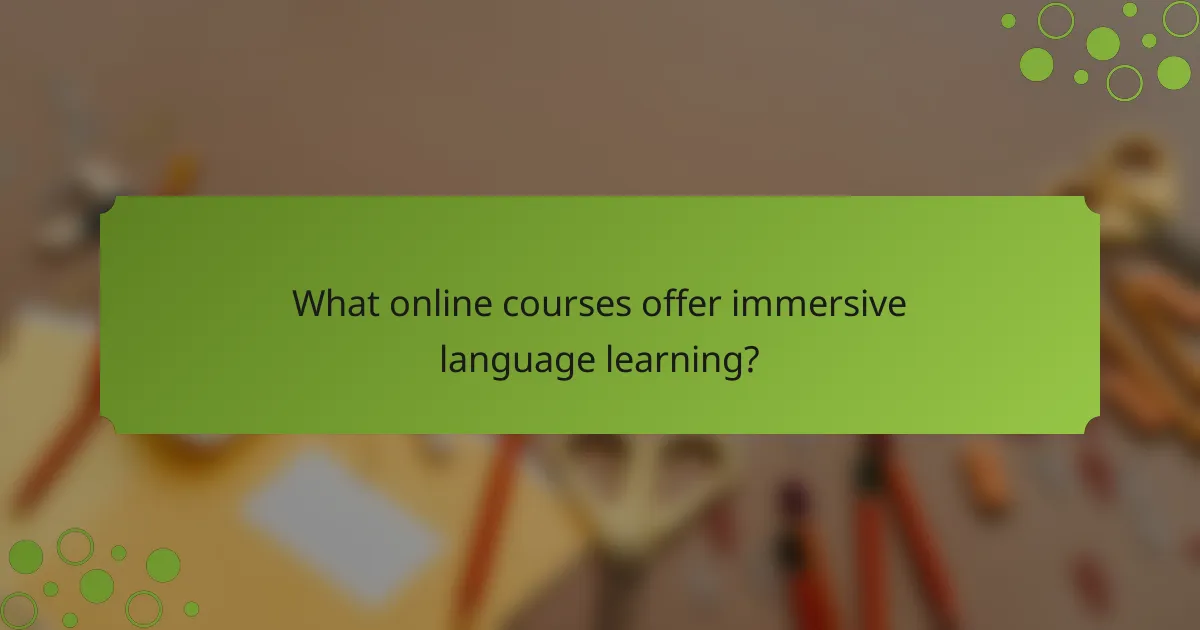
What online courses offer immersive language learning?
Online courses that provide immersive language learning focus on engaging students through interactive activities, real-life conversations, and cultural experiences. These courses often combine technology with practical applications to enhance language acquisition and fluency.
Rosetta Stone immersive courses
Rosetta Stone offers immersive courses that emphasize visual and auditory learning through a dynamic interface. Users engage with real-world scenarios, using images and sounds to connect words with meanings, which helps in retaining vocabulary and grammar naturally.
One key feature is the speech recognition technology that allows learners to practice pronunciation and receive immediate feedback. This method is particularly beneficial for those who prefer a self-paced learning environment without traditional grammar drills.
Babbel conversation-focused classes
Babbel’s conversation-focused classes prioritize speaking and listening skills, making them ideal for learners who want to engage in everyday dialogues. The courses are structured around practical topics, such as ordering food or making travel arrangements, which prepares students for real-life interactions.
Each lesson includes dialogues and exercises that mimic actual conversations, allowing learners to practice speaking in context. Babbel also offers a review feature that reinforces previously learned material, helping to solidify language skills over time.
FluentU cultural video lessons
FluentU utilizes authentic videos, such as movie trailers, music videos, and interviews, to teach language in a cultural context. This approach exposes learners to the nuances of the language, including slang and idiomatic expressions, while also providing insights into the culture associated with the language.
The platform allows users to interact with the content through subtitles and vocabulary lists, making it easier to understand and retain new words. This method is particularly effective for visual learners who benefit from seeing and hearing the language in use.
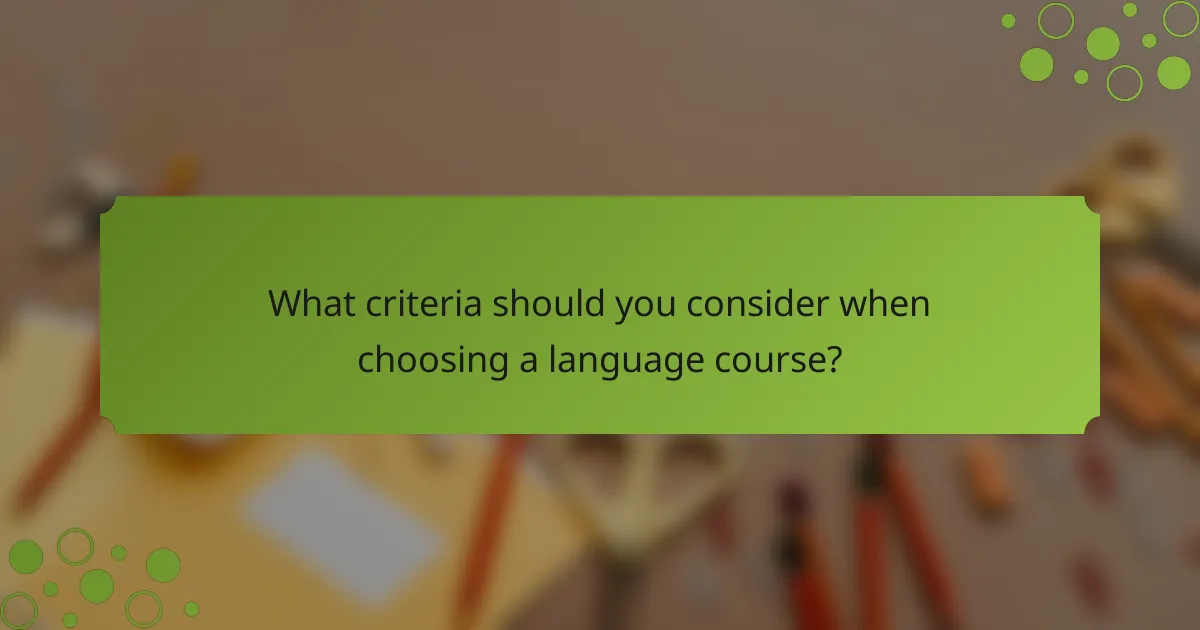
What criteria should you consider when choosing a language course?
When selecting a language course, consider factors such as course accreditation, instructor qualifications, and student reviews. These elements significantly impact the quality of education and your overall learning experience.
Course accreditation
Course accreditation ensures that the language program meets specific educational standards. Look for courses accredited by recognized organizations or institutions, as this can enhance the credibility of your learning experience.
Accredited programs often follow a structured curriculum and may offer recognized certifications upon completion. This can be particularly beneficial if you plan to use your language skills professionally or academically.
Instructor qualifications
The qualifications of instructors play a crucial role in the effectiveness of a language course. Check if the instructors have relevant degrees, certifications, and experience in teaching the language you wish to learn.
Instructors with native proficiency and teaching experience can provide valuable insights and cultural context, enhancing your conversational practice. Look for courses that offer opportunities for direct interaction with instructors to maximize your learning potential.
Student reviews and testimonials
Student reviews and testimonials provide firsthand insights into the course’s strengths and weaknesses. Look for feedback on the course structure, teaching methods, and overall satisfaction from previous students.
Consider platforms that aggregate reviews, as they can give you a balanced view of the course’s effectiveness. Pay attention to comments about the immersive learning experience and conversational practice opportunities, as these are critical for language acquisition.

How do pricing models vary for online language courses?
Online language courses typically utilize various pricing models, including subscription-based, pay-per-course, and freemium options. Each model has unique advantages and considerations that can affect your learning experience and budget.
Subscription-based pricing
Subscription-based pricing allows learners to access a range of language courses for a recurring fee, usually billed monthly or annually. This model can be cost-effective for those who plan to study multiple languages or take extensive courses over time.
When considering subscription plans, look for offerings that include features like live tutoring, interactive exercises, and cultural insights. Prices can range from around $10 to $50 per month, depending on the platform and the level of resources provided.
Be cautious of automatic renewals and cancellation policies. Always check if there is a free trial period to evaluate the course quality before committing to a subscription. This approach helps avoid unexpected charges and ensures the program meets your learning needs.
